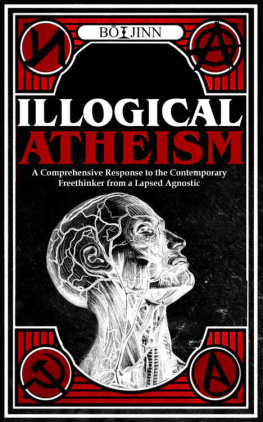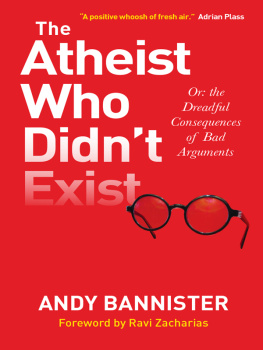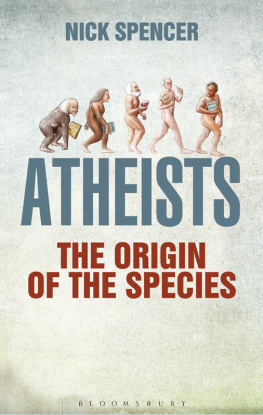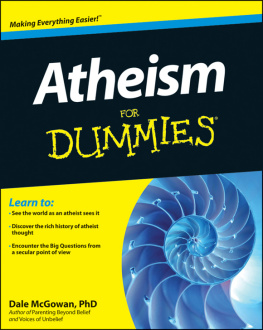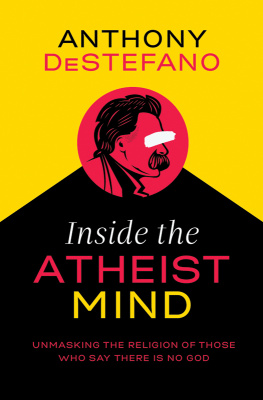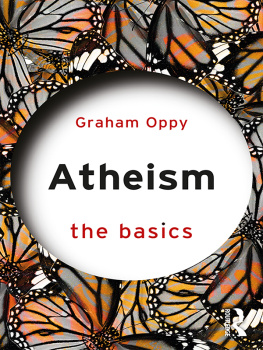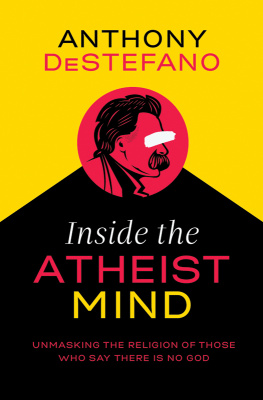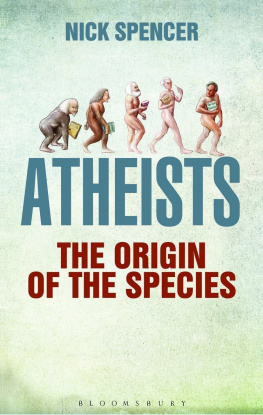He whostands for nothing, will fall for anything.
- Alexander Hamilton
It is safe to assume that I shall be winning no popularitycontests among the atheist community for my chosen title, much less for thewords that are to follow. Being an unashamed apostle of heterodoxy, I daresay Ishall not be receiving invitations to any apologetics conventions to reiterate myviews either. I suppose most people would justifiably classify the contents ofthis book as apologetics, and whilst I am not entirely opposed to thisdescription I do believe it is problematic for a number of reasons which willbe made clear in due time.
First things first. I am not especially religious, to the extentof the common definition. I am not an apologist, much less evangelist. Indeed,as I do type these words, my general sentiments toward our chosen subject areanything but apologetic. Long experience has taught that two not entirelymutually exclusive things are certain on the path to truth: cognitivedissonance and a quiet resentment for whatever view opposes our own, hence the cardinalvirtues of tolerance, compassion and respect in philosophical discourse. Ihave, however, come to understand that most ardent followers of the New Atheistmovement are unwilling to extend that courtesy to their theist counterparts.This prevailing impression was reaffirmed to me quite recently by theillustrious Richard Dawkins at the so-called Reason Rally on the 24th March2012 in Washington DC where, to the ovation of an audience of devotees, heprofessed his call to arms:
Mock them! Ridicule them! In public! And with contempt.
One neednt pursue ones own curiosity too far into the depths of NewAtheist cultism to strike upon the well of seething hostility that drives itspurpose. And it is a phenomenon I have chanced to encounter quite intimately,surrounding myself as I have throughout my life, specifically with people whothink differently than I, because they are the only people who could possiblymake me think.
I grew up, like most Europeans, in a community shaped by a long traditionof Christian values which, I can report, has only recently begun its descentinto western modernism, and with such leaping, bounding strides that I couldactually chronicle the whole fall from childhood. Religion became a matter ofmere casual assent by the time I reached my early teens and the words Ibelieve in God reduced to idle gibberish by my early twenties. All the othergifts of the long-delayed revolution followed in due course. To this dayI am not entirely sure whether my own generation was bred into it, or whetherit befell us from the outside like some vile disease with all the allure of aTrojan horse.
Either way, the definition of values has fast become, here, now,what it has long been in most parts of the western world: a mere afterglow ofthose mores of yore, continually battered away by great rush of modernity. Andthere developed an anger and frustration about it all which found its object inthe one insufferable institution fighting against that mass rape of the traditionalethos. Religion became a symbol of repression, a pharisaic figureheadobstructing the unfettered expression of unbounded instinct. The taboos of oldbecame the new traditions and the old traditions fast became the new taboos.This was the fertile soil in which the first seeds of freethought were sewn:those little pockets of simmering anger for the ball and chain of religion. Inthat context, I suppose the prospect of atheism was a definitive emancipationfrom airy-fairy and outdated superstitions.
I myself was not altogether fetched by the revolution, even whenfaced with the inevitable fact that tradition was steadily seeping down thegutters of history. Still, it had seemed to me that meaning was somethingcompletely human, something that had to be sought from the inside out. Religioninverted the process. God, if he existed, was something that had to be introspected. It had not immediately occurred to me that that was exactly what it meant to bean atheist, until an atheist finally came along and rather overenthusiasticallypointed it out to me. That, incidentally, was the day I chanced to blunderinto the fleapit of New Atheism.
Now, the first thing that struck me about the New Atheism is thatthere was nothing much very new about it. It was little more than the incensedand fanatical tittering of a worldview with which I was already fairly familiar,but which had apparently began to transform itself into a new religion,fervently proselytized by its large contingent of cyber-active post-pubescentdisciples. To be sure, I was not so much driven toward God as much as I was awayfrom this new, pestilent mainstream nonsense, and having encountered more thana few lapsed agnostics roused back to their former spiritual roots by thisfresh influx of antireligious zeal, I have hitherto come to view the New Atheistsas probably the best thing that ever happened to western Christianity, althoughit is still early to tell.
For a long time, the names Dawkins, Dennett and Harris were butfaint echoes in the background of this new movement, right up until the daythey graced the bookshelves of my personal library through a dearly beloved friendof mine, whereupon the source of that same reckless egotism and self-proclaimedintellectual superiority so typical of the more forthright of freethinkers wasrevealed to me in a single sentence, written by the New Atheist yogi, Mr.SamHarris in his book The End of Faith

